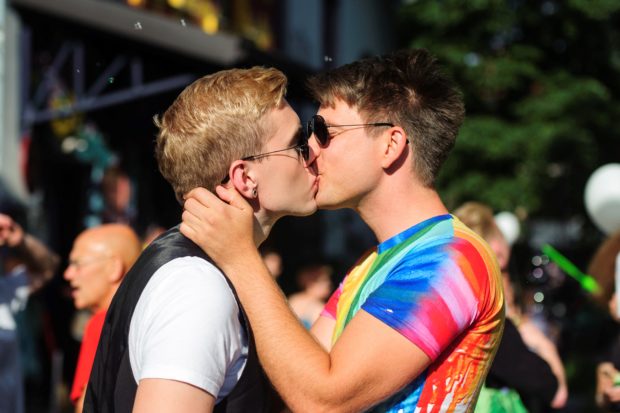
Men kiss as they take part in the Ljubljana Pride Parade in Ljubljana, on June 17, 2017. AFP FILE PHOTO
LJUBLJANA — Slovenia’s parliament on Tuesday legalized same-sex marriage, becoming the first eastern European country to give gay couples the same rights as their heterosexual counterparts.
The Constitutional Court had already ruled in July that same-sex couples could legally marry and adopt children, but Tuesday’s move formally legalizes the ruling.
The court ruled that the previous law discriminated against gay couples since it defined marriage as the union of a man and a woman and only gave heterosexual couples the right to adopt.
Its decision suspended the disputed articles, thereby giving same-sex couples the right to marry and adopt children. It ordered parliament to change the law within six months.
The revised law passed on Tuesday with 48 votes in favor, 29 against and one abstention.
“With these changes, we simply state that differences should not give way to discrimination,” State Secretary Simon Maljevac told MPs as he presented the amendment.
“We recognize the rights of same-sex couples that they should have had a long time ago,” he added.
The main conservative opposition Slovenian Democratic Party (SDS) has criticized the court’s ruling and organized several rallies that were attended by thousands of people to oppose the changes it says go against the laws of nature.
“Adoption is not about the rights of (same-sex) couples that wish to have a child, it’s about helping children,” the head of SDS’s parliamentary group, Alenka Jeraj, told lawmakers.
“Not even the best father can replace a mother, and no mother can replace a father,” Jeraj said.
A total of 18 European countries have legalized same-sex marriage and most of them also allow gay couples to adopt.
Some European countries allow same-sex couples to enter civil partnerships but not to marry, namely the Czech Republic, Croatia, Cyprus, Estonia, Greece, Hungary and Italy.
Most eastern European countries have not legalized gay marriage or civil partnerships.
RELATED STORIES
Pope backs family values in Slovenia ahead of gay marriage vote
Reclaiming safe spaces for the LGBTQIA+ community